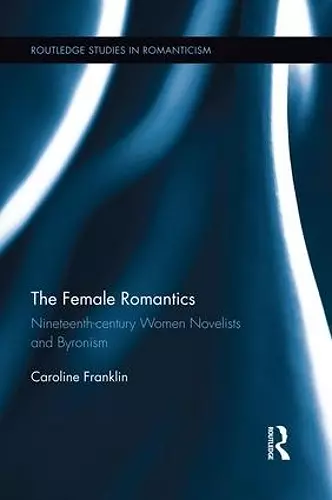The Female Romantics
Nineteenth-century Women Novelists and Byronism
Format:Paperback
Publisher:Taylor & Francis Ltd
Published:10th Nov '14
Currently unavailable, and unfortunately no date known when it will be back
This paperback is available in another edition too:
- Hardback£160.00(9780415995412)

Awarded the Elma Dangerfield Prize by the International Byron Society in 2013
The nineteenth century is sometimes seen as a lacuna between two literary periods. In terms of women’s writing, however, the era between the death of Mary Wollstonecraft and the 1860s feminist movement produced a coherent body of major works, impelled by an ongoing dialogue between Enlightenment ‘feminism’ and late Romanticism. This study focuses on the dynamic interaction between Lord Byron and Madame de Staël, Lady Morgan, Mary Shelley and Jane Austen, challenging previous critics’ segregation of the male Romantic writers from their female peers.
The Romantic movement in general unleashed the creative ambitions of nineteenth-century female novelists, and the public voice of Byron in particular engaged them in transnational issues of political, national and sexual freedom. Byronism had itself been shaped by the poet’s incursion onto a literary scene where women readers were dominant and formidable intellectuals such as Madame de Staël were lionized. Byron engaged in rivalrous dialogue with the novels of his female friends and contemporaries, such as Caroline Lamb, Mary Shelley and Jane Austen, whose critiques of Romantic egotism helped prompt his own self-parody in Don Juan. Later Victorian novelists, such as George Sand, the Brontë sisters and Harriet Beecher Stowe, wove their rejection of their childhood attraction to Byronism, and their dawning awareness of the significance for women of Lady Byron’s actions, into the feminist fabric of their art.
"Literary celebrity in nineteenth-century Britain was a male game, and… famous woman writers played this game in order to change it. The risk of this strategy is one made especially evident in Franklin’s book.
[This book] provide[s] nuanced accounts of how women writers resisted masculine models of influence, but also demonstrate[s] the danger of being seduced by the very paradigm, or paragon, you set out to reform." - Times Literary Supplement
"Franklin displays two outstanding strengths. First, she reads intertextuality through politics, showing that women's novels used Byron to stage major debates about government, the status of the political subject, and the rights of the individual in society.
Second, she reads the individual texts of an author in terms of her whole career, so that we see not snapshots but a trajectory. Since most of the writers she treats were less prolific than their Victorian successors, she can effectively analyze the novels of each within a single chapter." - Andrew Elfenbein, Professor of English at the University of Minnesota
'...Franklin's The Female Romantics provides such an effective outline of women writers' responses to Byronism that scholars interested in Byron's reception history will find much of note here.' - European Romantic Review
"The study may well be considered the first major contribution to the reclamation of Byron for researchers and students of gender since Susan Wolfson’sBorderlines (2006), and Franklin’s own Byron’s Heroines (1992). …. Engaging as it does with two major cross-currents of Byron scholarship, the book would be of interest to dedicated Byronists, as well as to students and scholars working in any aspect of nineteenth-century gender studies. The Female Romantics is a timely piece of research that should be considered as an invitation to scholars to engage more closely with the possibilities Byron’s literary relations with women hold." -Anna Camilleri, University of Oxford in The Byron Journal
"Franklin establishes what many scholars have long believed, that women’s fiction of the early and mid-nineteenth century responded to Byron and his poetry in varying ways, depending on if the woman writer was engaging with the poet as a model for religious, political, national, or sexual freedom. The work is organized chronologically by author and sub-genre, focusing in turn on travel writing, the gothic, oriental tales, love stories, bildungsroman, spiritual pilgrimage, and political crusade.
… Franklin’s The Female Romantics: Nineteenth-century Women Novelists and Byronism is a well-written, convincingly argued study that helps to bridge the gap between two time periods stereotypically thought to be at odds in terms of literary history, the Romantics and the Victorians. Franklin demonstrates very well that Byronism is one of the unifying connective tissues running throughout the long century." - Denise Tischler Millstein, Stephen F. Austin State University in Studies in the Novel
ISBN: 9781138850743
Dimensions: unknown
Weight: 362g
264 pages